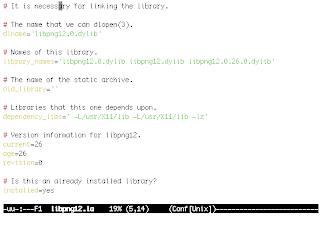If you’re compiling transcode 1.0.5 from source on OS X Intel (for some odd reason, as I’ve just had to do on 10.5.4), your compile run may blow up in aclib with:
tcmemcpy.c:30:missing or invalid immediate expression `0b111' taken as 0
tcmemcpy.c:30:suffix or operands invalid for `and'
tcmemcpy.c:42:missing or invalid immediate expression `0b1000' taken as 0
tcmemcpy.c:42:suffix or operands invalid for `test'
tcmemcpy.c:52:missing or invalid immediate expression `0b1111' taken as 0
The problem here appears to be that the code in tcmemcpy.c under x86 and x86_64 relies on some inline assembly features not supported by all compiler/assemblers. Namely, the use of 0b (binary immediate) operands in assembly instructions is not apparently supported during compilation under Apple gcc and gcc-4.2.
Setting the CCAS flag did not seem to help. A quick fix, then, is to convert all binary immediates in the asm instructions to hex or decimal.
Thankfully, these operands only existed in tcmemcpy, so there’s not too much work. Look for 0bxxxx immediates and convert them to their hex or decimal equivalent. For example, 0b111 is 0x7, 0b1000 is 0x8, 0b1111 is 0xf. Thus, a line like:
and $0b111, %%eax # ... which is the number of bytes to copyn
becomes
and $0x7, %%eax # ... which is the number of bytes to copyn
Once these operands are modified, the compiler should no longer complain about invalid immediate expressions.
In any case, the latest CVS version of transcode should have resolved these problems already. The workaround should only be necessary if you still must compile the release tarball for 1.0.5.
Updated: There is a second potential problem if you were using ffmpeg-SVN and transcode 1.0.5, in which its hard-coded include lookup for avcodec.h always looks for ffmpeg/avcodec.h. The SVN version of ffmpeg has moved these headers to libavcodec/avcodec.h. A path patch for transcode 1.0.5 and ffmpeg is available, which basically boils down to changing the #include headers and the configure.in file to look for the new path.
Updated: A third problem has now cropped up, with the ffmpeg API change that moved AVCodecContext’s bits_per_sample to bits_per_coded_sample. A global search and replace seems to work for now. See this also in my post on compiling Perian.
